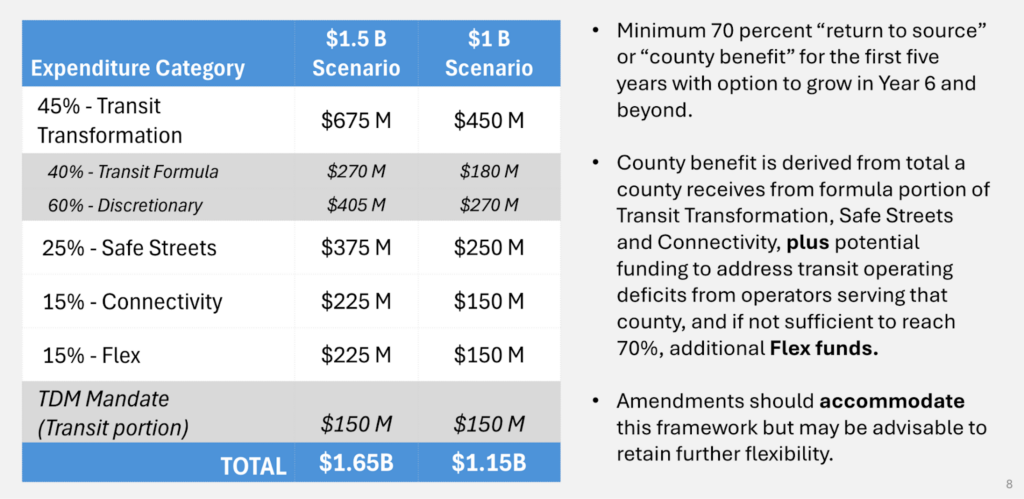On Wednesday May 1 and Thursday, May 2, the SamTrans, Caltrain, and VTA boards will review their positions on AB1831, the Connect Bay Area Act. This important bill would authorize a regional transportation funding measure that would keep transit running at Caltrain, BART, and other agencies facing post-pandemic budget challenges, and would support more frequent and better coordinated service around the region.
These agencies had taken “Oppose unless amended” positions at their April board meetings, raising a number of concerns. Since then, the bill has been amended addressing concerns from agencies and other stakeholders. With these amendments, the bill passed out of the Senate Transportation Committee on Tuesday and Senate Revenue and Tax Committee on Wednesday.
This coming week’s board meetings will be a pivotal moment showing whether our region’s institutions will work together in the common interest, or will compete to the detriment of riders.
Funding allocation. The bill has been amended to clarify the amount of funding for different spending categories, counties, and agencies.Guardrails on MTC’s Network Management role to prevent unintended consequences that could harm agencies’ serviceClarifications to the language on the consolidation study. The outcome of the study will be a report and not a plan; the study would assess benefits and disbenefits to riders, and the administrative, financial, legal, contractual, and governance feasibility, and the study will cover many options including merging functions (such as co-locating facilities and collaborating on vehicle purchases). Transportation demand management. The bill has placeholder language on transportation demand management requirements for larger employers; this language is still being refined
Further amendments were added based on negotiations on Tuesday prior to the Senate Transportation hearing, including setting a goal to raise $1.5 billion annually, with a sales tax limited to .5 percent (which would raise about $1 billion); setting MTC’s authority to put a measure to voters after 2040, and setting a duration of taxes raised to 30 years; and eliminating a provision giving MTC discretion over state TDA funds to ensure participation in regional coordination initiatives.
Reauthorizing local taxes
Agencies including SamTrans and VTA are concerned about reauthorizing older sales taxes. San Mateo County Measure A was last reauthorized in 2004 and continues through 2033. Santa Clara County VTA Measure A was passed in 2000 and continues through 2036. Given these timelines, there seem to be multiple timeline options to fund regional and local transportation priorities.
Consequences for state funding and major capital projects
At a Metropolitan Transportation Commission workshop on Wednesday, May 24 and Thursday, May 25, the commission received an overview of the budget status and funding sources for public transit in the region.
Over the years, MTC has had longstanding discretion over state funding in counties served by multiple transit agencies. The Wednesday workshop data showed how, MTC has prioritized using this funding for local bus services, based on policies with higher fares generating revenue for regional rail services. However, if the regional services were at risk, MTC has discretion to make changes.
At the Thursday workshop, Commissioners reviewed the outlook for capital projects. The region is anticipating less funding in its 30-year long-term plan than was previously projected, and some major projects, such as the $50B Link21 second transbay rail crossing already appear to be at risk
But also, the 2023 state budget that provided stopgap funding for transit operations allowed funding for major capital programs to be made flexible for use for transit service. The MTC decided not to make this choice, and to continue advancing major projects including BART to Silicon Valley and the Portal connecting Caltrain to downtown San Francisco.
If SB1031 stalls and a regional funding measure is not moving forward, a painful but logical choice would be to use state funding to keep the services running, and to delay the capital projects to extend the rail lines. It doesn’t make sense to extend the lines if there isn’t enough money to run the existing service.
All of the funding, none of the strings
Despite the amendments, some board members and agencies are taking forceful positions that what they want out of a measure is unconditional funding. Mayor Mahan sent a letter with demands for 90% “return to source” without conditions.
Unfortunately, this approach would not deliver the outcomes intended for the bill. According to analysis by MTC, even 80% return to source would not generate enough funding to maintain service at agencies including Caltrain, BART, SFMTA and AC Transit. And a “no strings attached” measure would not deliver the well-coordinated service that voters continue to support with repeatedly high polling results.
Watch and comment at board meetings
You can watch and make comment at the board meetings on Wednesday and Thursday
Wednesday May 1st at 2pm: Samtrans Board Meeting
Thursday May 2nd at 9am: Caltrain Board Meeting
Thursday May 2nd at 5:30pm: VTA Board Meeting

